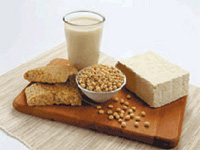Macrobiotics, or the Macrobiotic Diet is just a diet but a lifestyle - the diet features fish, beans, rice, sea vegetables, combined with locally grown organic vegetables and Buddhist principles of Ying and Yang; your are encouraged to be active. Althouhg the American Cancer Association stopped short of recommending as an anti-cancer diet, they do recommend this type of plant-based diet for preventing cancer.
Unlike most modern-day diets, many of which seem to have been created or invented with slimming in mind, macrobiotics is best described by the phrase "back to basics".
Macrobiotics as a word comes from the Greek: macro meaning great or long and biotic meaning, concerning life. The original word was attributed to Hippocrates, the father of modern medicine. However the concept of macrobiotics is much more than an alternative diet for cancer, or any other illness, but rather the ancient Chinese belief that all life, indeed the whole universe, is a balance of two opposing forces Yin and Yang.

The concept of macrobiotics is focussed on the ancient Chinese belief that all life is a balance of two opposing forces Yin and Yang

Ones environment, one’s lifestyle, one’s diet and one’s health are all interlinked just as one’s soul is linked to the greater universe and the community at large. A disease in an individual is an affliction on the community, a measure of its failings, and cannot be thought of as separate or confined to the individual.
Between 1896 and 1907 a Japanese army officer who was even then deeply concerned at the Westernisation of the traditional Japanese diet, implored the Japanese people to re-embrace their traditional healthy values. Sagen lshizuka went "back to basics" and stated his basic belief that the food we eat not only sustains life, it makes for our basic health and happiness. He set up a clinic and started to treat hundreds of patients with the principles of Yin and Yang, and his traditional Japanese peasant diet. His fame and success brought him the title of the "anti-doctor"!
In the 1950’s Georges Ohsawa brought the macrobiotic principles and diet to the West. Michio Kushi consolidated this and there is a Kushi Institute in London.
The modern macrobiotic diet is not dissimilar to the diet still used by Okinawans. Surrounded by a coral sea, their diet has less carbohydrate (and therefore calories) than even the Japanese diet, and small amounts of protein from fish and vegetables. They have an extremely high organic mineral intake, the lowest cancer rates in the world bar none, and an average life expectancy of 81.2 years, the highest in the world.

Most disease, and especially cancer, is regarded as having a Yin cause

Yin elements in the diet are regarded as cold, slow, filling and weak; Yang in contrast is quick, dry and hard. Most disease, and especially cancer, is regarded as having a Yin cause. However, all aspects of any individual’s life should be assessed by Yin and Yang principles, not just their diet. Any excess thought to be causing an illness can then be corrected or counterbalanced by providing foods of the opposite force. The Macrobiotic Association of Great Britain (Tel: 020 8741 0279) can provide details of consultants who can help with specific dietary and health advice.
The five basic principles are that:
1:
Foods are the foundation of health and happiness
2:
Sodium and potassium are opposites in food, reflecting opposing yin and yang forces
3:
Man’s staple food is grain
4:
Food should be unrefined, whole and natural
5:
ood should be grown locally, ripe and consumed in season

We are all individuals and one man’s grain is another man’s poison

If you meet with a macrobiotic consultant concerning a cancer, do not be surprised if he delves into everything in your past from diet to lifestyle, from illnesses to allergies.
He is likely to recommend a core diet, although a fundamental tenet of macrobiotics is that we are all individuals and one man’s grain is another man’s poison.
The core diet is likely to include:
* whole grains (e.g. millet, barley, brown rice)
* vegetables (including pulses and some fruits)

* seaweed and sea vegetables
* fermented soya products (e.g. tofu, shoyu and miso soup)
* regular oily fish intake (for omega 3)
* monosaturated oils
* Japanese low caffeine green tea.
Everything needs to be fresh where possible and freshly prepared. Freshly prepared juices may be recommended, raw food may not at the outset, as even if vegetables are only blanched, cooked foods have more "fire", more energy. Dairy, sugar and meat are likely no-go foods. Organic food predominates, wherever possible, and the advice may be extended to include exercise, yoga and even a little meditation.
A change to a macrobiotic diet and, indeed, lifestyle has helped many people achieve a new level of health and, as cancer nutrition and a diet for cancer, it has helped many cancer patients. It does require effort and time, but it does not have to be forever. Some people find its corrective action may only be needed for a year or so.
What have you got to lose? After all, it’s only natural.